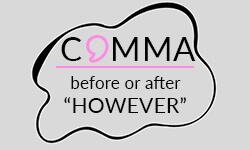
Commas are a topic of confusion for many students, which leads to errors in their academic writing. Many of them are unaware of the exact rules and the exceptions, resulting in regular mistakes. This article wants to explain the specific exceptions and grammar rules of the usage of commas before and after the conjunction “however”. Clarity will be offered by explaining the different cases with examples.
When to place a comma before “however”
In general, the comma placement depends on where “however” is located in the sentence.
Comma
Linking two independent clauses
End of a sentence
No comma
When used as an adverb
The usage of comma rules can differ based on the specific Style Guide you’re following. Furthermore, there could be exceptions when dealing with intricately structured sentences in terms of comma placement. It’s always beneficial to contemplate if your sentence maintains clarity and ease of reading even without the comma.
Comma before “however”
A comma before “however” is only ever placed in two cases: When the conjunction is written at the end of the sentence or if “however” links two independent clauses.
Linking two independent clauses
When “however” links two independent clauses, a comma is placed after the word.
End of a sentence
When “however” appears at the end of a sentence, it should be preceded by a comma and followed by appropriate punctuation.
Comma after “however”
When “however” is in the beginning to introduce a sentence or clause, it should have a comma after.
Comma before and after “however”
When “however” is in the middle of a sentence to set off a parenthetical phrase that adds a strong contrast.
No comma before or after “however”
If “however” is used as an adverb to mean “nevertheless” or “in spite of that,” there is no comma after it. In this case, “however” functions as a transitional adverb, and it does not require a comma following it.
Test yourself!
Practice sheet
Test your understanding by placing the commas in the right positions in the 10 sentences. You can then find the correct answers in the second tab to check if you grasped the right understanding.
- I wanted to go to the party; however I had to stay home and finish my work.
- However challenging the task may be, I am determined to complete it.
- I did not like the shop however.
- The experiment yielded interesting results; however the methodology was flawed.
- However I did not agree with this argument.
- He wanted to go to the party however he had a lot of work.
- They had made significant progress; however unforeseen challenges arose.
- She studied hard for the test; however she still didn’t achieve the desired grade.
- However much he pleaded, she remained firm in her decision.
- However hard they tried, the team couldn’t secure the victory.
- I wanted to go to the party; however, I had to stay home and finish my work.
- However challenging the task may be, I am determined to complete it. (No comma)
- I did not like the shop, however.
- The experiment yielded interesting results; however, the methodology was flawed.
- However, I did not agree with this argument.
- He wanted to go to the party, however, he had a lot of work.
- They had made significant progress; however, unforeseen challenges arose.
- She studied hard for the test; however, she still didn’t achieve the desired grade.
- However much he pleaded, she remained firm in her decision. (No comma)
- However hard they tried, the team couldn’t secure the victory. (No comma)
- ✓ 3D live preview of your individual configuration
- ✓ Free express delivery for every single purchase
- ✓ Top-notch bindings with customised embossing

FAQs
No, a comma before “however” is not always necessary. It depends on its usage. If “however” is used as an adverb, it is not required.
Yes, as a parenthetical phrase within a sentence.
A comma is commonly used after “however” when it is positioned at the beginning of a sentence or when it is used within a sentence to set off an interruptive or parenthetical element. This comma helps separate “however” from the rest of the sentence and indicates a contrast or provides additional information.
